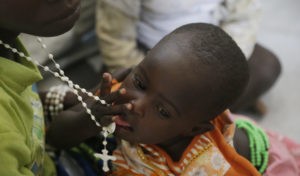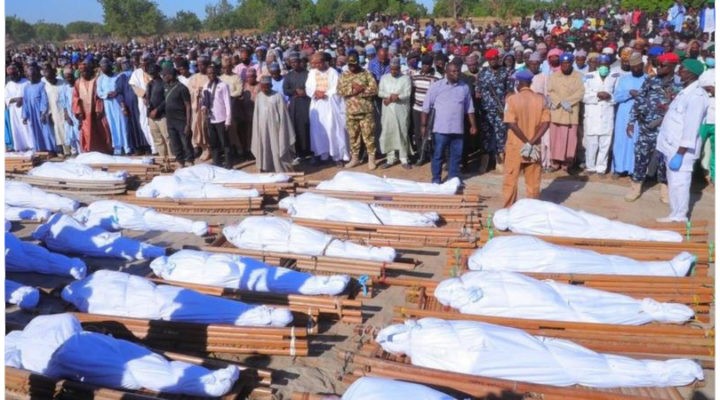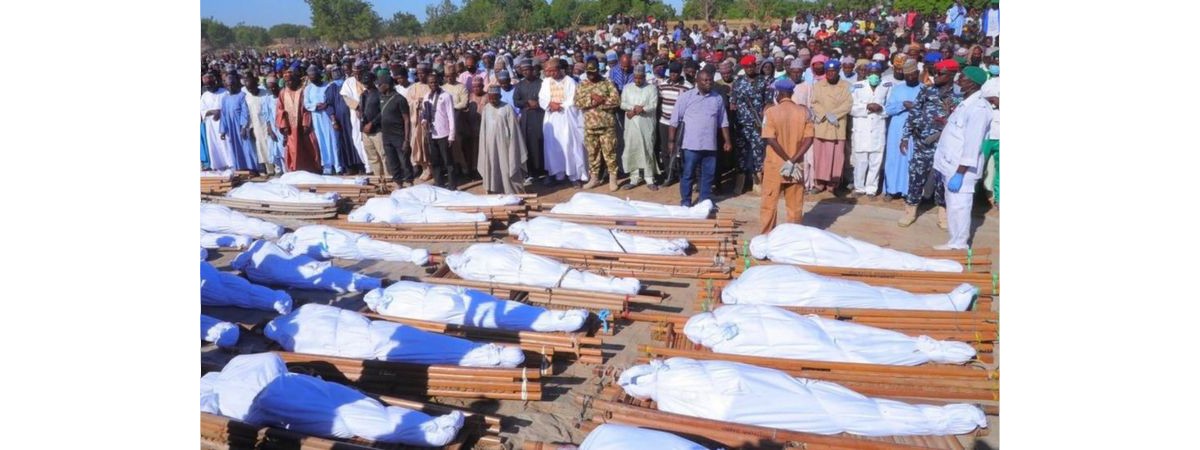The nation’s top bipartisan watchdog for international religious freedom praised one addition by the U.S. State Department to its 2021 list of Countries of Particular Concern for religious freedom violations but expressed astonishment that another country was dropped from the list.
U.S. Secretary of State Antony Blinken announced Nov. 17 this year’s list of the most egregious violators of religious liberty. Notably absent from this year’s list is Nigeria, where religious violence untamed by the government has left hundreds of people murdered this year. Nigeria had been added to the list last year, and the U.S. Commission on International Religious Freedom had urged the State Department to keep Nigeria on the list.

Antony Blinken
Meanwhile, Blinken announced the addition of Russia and Algeria to the list — welcome news to the USCIRF and other international religious liberty advocates.
U.S. ‘will not waver’ on cause of religious liberty
“The United States will not waver in its commitment to advocate for freedom of religion or belief for all and in every country,” Blinken said. “In far too many places around the world, we continue to see governments harass, arrest, threaten, jail and kill individuals simply for seeking to live their lives in accordance with their beliefs. This administration is committed to supporting every individual’s right to freedom of religion or belief, including by confronting and combating violators and abusers of this human right.”
He named 10 countries the State Department currently designates as Countries of Particular Concern for having engaged in or tolerated “systematic, ongoing, and egregious violations of religious freedom.” Those are Burma, China, Eritrea, Iran, North Korea, Pakistan, Russia, Saudi Arabia, Tajikistan, and Turkmenistan.
Blinken further noted four countries now fall on the State Department’s Special Watch List for governments that have engaged in or tolerated “severe violations of religious freedom.” Those are Algeria, Comoros, Cuba, and Nicaragua.
While Nigeria escaped the bad list this year — no explanation was given as to why — the groups causing most of the chaos in Nigeria and other nearby countries were designated by Blinken as Entities of Particular Concern. That list of bad actors includes al-Shabab, Boko Haram, Hayat Tahrir al-Sham, the Houthis, ISIS, ISIS-Greater Sahara, ISIS-West Africa, and Jamaat Nasr al-Islam wal-Muslimin.
“While Nigeria escaped the bad list this year … the groups causing most of the chaos in Nigeria and other nearby countries were designated by Blinken as Entities of Particular Concern.”
“We will continue to press all governments to remedy shortcomings in their laws and practices, and to promote accountability for those responsible for abuses,” Blinken said. “The United States remains committed to working with governments, civil society organizations and members of religious communities to advance religious freedom around the world and address the plight of individuals and communities facing abuse, harassment and discrimination on account of what they believe, or what they do not believe.”
‘Unexplainable decision’
Soon after the State Department announcement, the USCIRF issued a statement declaring it “unexplainable” that the State Department did not redesignate Nigeria as a Country of Particular Concern “and treated it as a country with no severe religious freedom violations.”

Nadine Maenza
“USCIRF is disappointed that the State Department did not adopt our recommendations in designating the countries that are the worst violators of religious freedom,” said USCIRF Chair Nadine Maenza. “While the State Department took steps forward on some designations, USCIRF is especially displeased with the removal of Nigeria from its CPC designation, where it was rightfully placed last year, as well as the omission of India, Syria, and Vietnam. We urge the State Department to reconsider its designations based on facts presented in its own reporting.”
The bipartisan international religious freedom group — which is part of the federal government but separate from the State Department — had suggested all 10 of the countries of concern listed by Blinken be on this year’s list but also had urged the same for four others: India, Nigeria, Syria, and Vietnam.
In addition to the countries formally placed on this year’s Special Watch List, the USCIRF had recommended the inclusion of Afghanistan, Azerbaijan, Egypt, Indonesia, Iraq, Kazakhstan, Malaysia, Turkey, and Uzbekistan.
Despite this disappointment, the USCIRF is pleased that for the first time Russia has been designated as a Country of Particular Concern “for engaging in systematic, ongoing and egregious violations of religious freedom.”
USCIRF has proposed Russia’s inclusion since 2017.
Likewise, USCIRF “applauds the inclusion of Algeria in the State Department’s Special Watch List designations this year, which USCIRF has recommended since 2020 due to continued enforcement of blasphemy laws and restrictions on houses of worship for minority religious communities,” said USCIRF Vice Chair Nury Turkel.
Entities of concern
And USCIRF welcomed the State Department’s designations of the nine Entities of Particular Concern because they “engage in systematic, ongoing and egregious violations of religious freedom” as outlined in the International Religious Freedom Act.

On Monday, Feb. 18, 2019, Rebecca Ishaku, a child displaced by Boko Haram extremists, plays with a rosary as she is carried by her mother, Lucy Ishaku, at Malkohi camp in Yola, Nigeria. (AP Photo/ Sunday Alamba)
In its 2021 Annual Report, USCIRF recommended that the U.S. State Department designate al-Shabaab, Boko Haram, Hay’at Tahrir al-Sham, the Houthis, Islamic State in the Greater Sahara, Jamaat Nasr al-Islam wal Muslimin, and the Taliban as Entities of Particular Concern.
USCIRF has produced a fact sheet that details how some of the gravest threats to freedom of religion in recent years have come not from government actions, but from non-state actors.
In September, the commission released a country update on Yemen, which details the alarming trends of increased Houthi persecution there against Baha’is, Christians and Jews. Likewise, the commission produced a fact sheet on violent Islamist groups in Northern Nigeria, including Boko Haram, Islamic State in West Africa Province and Islamists in Central Sahel.
About the USCIRF
The U.S. Commission on International Religious Freedom is an independent, bipartisan federal government entity established by the U.S. Congress in 1998 to monitor, analyze and report on religious freedom abroad. It makes foreign policy recommendations to the president, the secretary of state and Congress.
The commission was created by the International Religious Freedom Act and operates with 10 commissioners appointed to two-year terms. Three each are named by the president, the president pro tempore of the Senate and the speaker of the House of Representatives, with one at-large commissioner rounding out the group.
The unpaid commissioners currently are Nadine Maenza (chair), president of Patriot Voices and a member of the board of directors at the Institute for Global Engagement; Nury Turkel (vice chair), chairman of the board at the Uyghur Human Rights Project; Anurima Bhargava, president of Anthem of Us and former chief at the Educational Opportunities Section of the Civil Rights Division of the United States Department of Justice; James W. Carr, president of Highland Home Holdings and former executive vice president and professor of business at Harding University; Frederick A. Davie, executive vice president at Union Theological Seminary; Khizr Khan, founder of the Constitutional Literacy and National Unity Center; Sharon Kleinbaum, spiritual leader at Congregation Beit Simchat Torah and commissioner of the New York City Commission on Human Rights; and Tony Perkins, president of the Family Research Council.
The State Department maintains its own Office of International Religious Freedom also established under the International Religious Freedom Act.
Related articles:
Boko Haram is still plaguing Nigeria claiming to do God’s work


